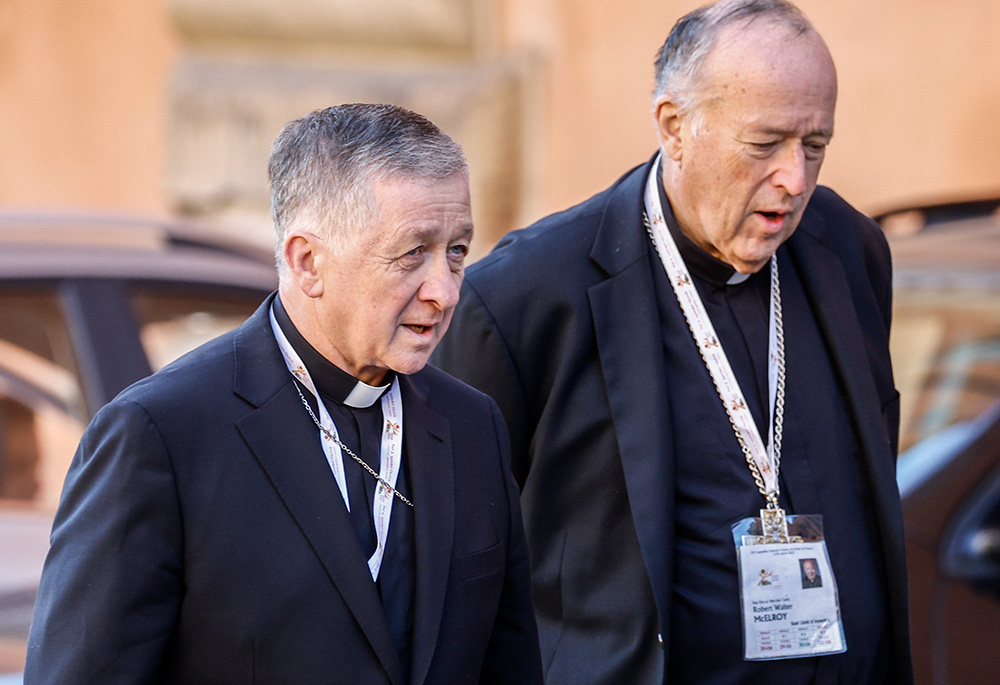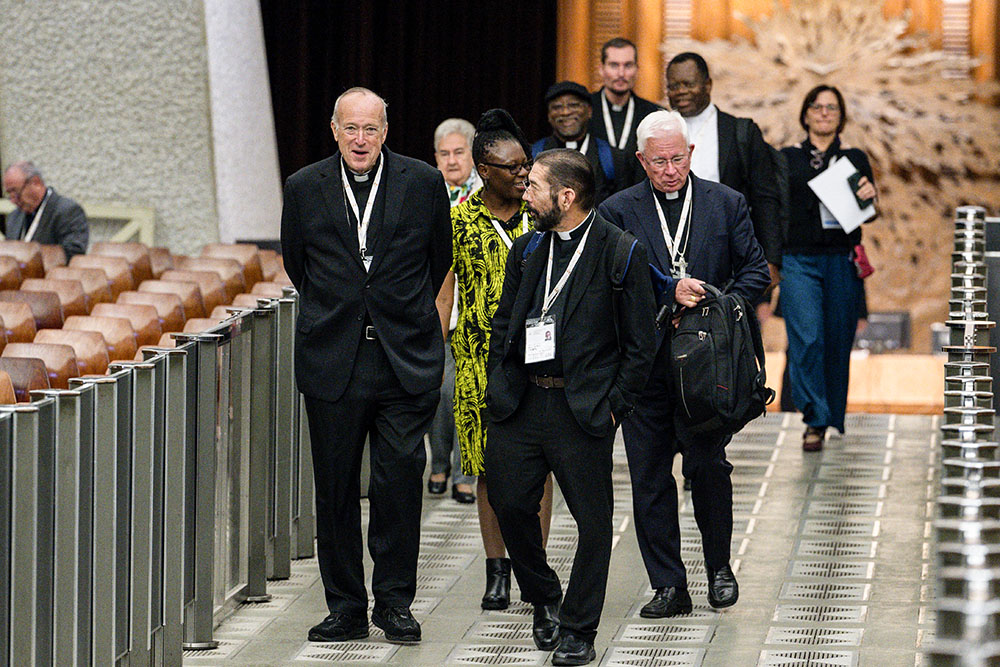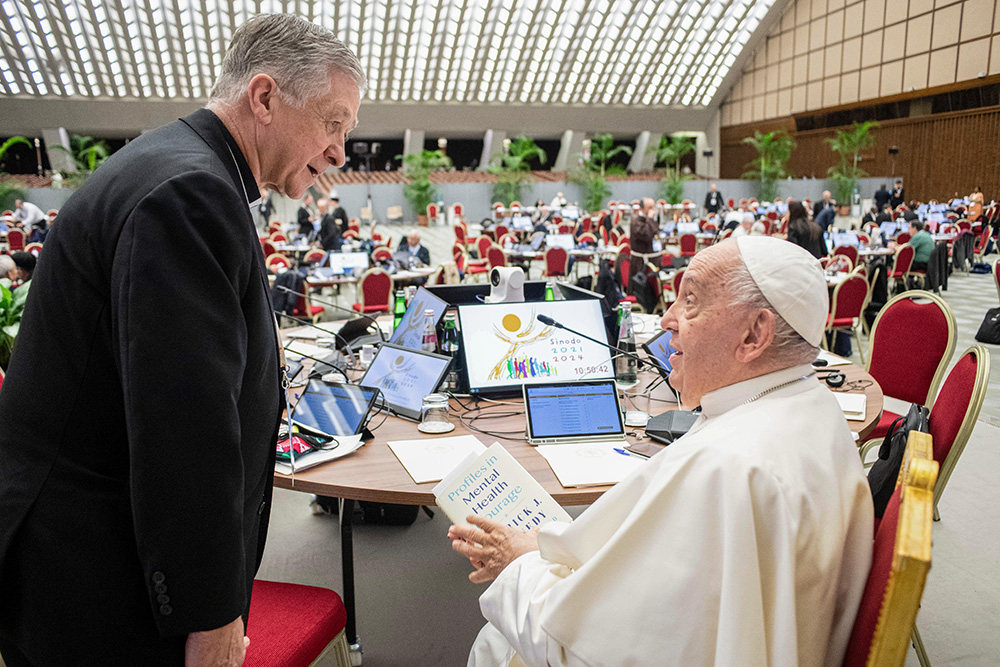
Chicago Cardinal Blase Cupich, left, and San Diego Cardinal Robert W. McElroy arrive for a session of the first assembly of the synod on synodality in the Vatican's Paul VI Audience Hall Oct. 17, 2023. (CNS/Lola Gomez)
Two top U.S. cardinals are calling for the U.S. bishops' conference to revamp its governance structures to better reflect Pope Francis' call for a more synodal church.
"There needs to be an establishment of a committee on synodality," said San Diego Cardinal Robert McElroy on Oct. 27, proposing the permanent addition of a body responsible for implementing and assessing the work initiated by the synod.
"It needs to be properly staffed and resourced," Chicago Cardinal Blase Cupich added. "I don't think there's any escaping it."
The two cardinals spoke in a joint interview with National Catholic Reporter on Oct. 27, just hours after Francis presided over the concluding Mass for the synod on synodality.
On Oct. 26, the synod delegates, including Cupich and McElroy, voted to approve the synod's Final Document, which, among its many proposals, calls for greater accountability and transparency in decision-making.
"It's very clear from the document that this is what we're supposed to do," Cupich said of the need to rethink the current governance structures of the U.S. Conference of Catholic Bishops.
"This has to come in at the top of the list," he said, noting that the conference has to reevaluate how it is dedicating resources and "holding ourselves accountable for building a synodal, missionary church."
The 40-minute interview with Cupich and McElroy took place at the Pontifical North American College, the primary residence for U.S. seminarians studying in Rome.
The cardinals' reflections on the state of the U.S. bishops' conference comes ahead of the body's November general assembly. Among its agenda items, the bishops are expected to discuss the fallout resulting from the conference's leadership decision to overhaul its social justice department.
Women, liturgy and lay preaching
Reviewing the monthlong synodal assembly — which brings to a conclusion the pope's three-year consultation process on the future of the Catholic Church — Cupich said that the final document makes it clear that the "whole hierarchy is called to embrace this important effort of building a synodal, missionary church."
While McElroy acknowledged that there are some church reform groups that have already expressed disappointment that the synod did not lead to particular changes, he emphasized that it serves as a turning point for greater lay involvement in all levels of church life.

Cardinal Robert McElroy of San Diego, left, and Bishop Daniel Flores of Brownsville, Texas, arrive for a working session of the synod on synodality in the Paul VI Audience Hall at the Vatican Oct. 11, 2024. (CNS/Vatican Media)
In particular, he said the synod's insistence on evaluation of ministers and ministries is a real novelty of the document.
"If that's implemented, that will be a big change," he said. "Respectfully, all of us are going to be put in a position where we have to respond in a caring way and an honest way to questions that are put to us about why we're doing and why we're not doing what we should be doing."
On the much-discussed question of women's ministries, McElroy noted the document states that, with the exception of ordained ministries, obstacles blocking women's participation in the full life of the church should be removed.
At present, he said, this is more of a cultural challenge, rather than one that concerns church law.
"Most of the obstacles are not the legal ones in the church," he said. "Most of them, broadly, are prejudices that women shouldn't be doing certain things or that men should be preferred."
"This assertion is contrary to the Gospel and contrary to being a missionary, synodal church," McElroy continued. "There's cultural change that needs to take place so those obstacles aren't present."
The San Diego cardinal, who has long voiced his support of the restoration of the female diaconate, emphasized that this remains an open question according to the synod.
"I myself am in favor of women being ordained to the diaconate, and I hope to see that happen," he said.
Advertisement
Cupich noted that since the pope gave his full consent to the synod's final document — which states that women deacons need further discernment — that this means the pope himself is in favor of keeping the question alive.
"No one should try to mischaracterize this," he cautioned.
Among the proposals in the synod's final document is a creation of a special study group to consider how liturgical celebrations might offer a better expression of synodality.
At present, said Cupich, "opportunities for lay involvement in the liturgy is not universally applied," and he hoped the study group could provide some guidelines on "how to make that happen."
While a blanket declaration for lay preachers would be an "easy out," he said, "it's worth looking at at what point can there be testimony witness to the Gospel by the lives of people included in the homily presentation."
"My concern would be, how is the voice of people, in terms of the lived faith, represented in the sharing of the word of God?" said the cardinal. "That's the question that needs to be asked."
McElroy added when liturgical questions are considered, there is the "visible challenge." He noted that one current problem is that in large liturgical celebrations, the sanctuary is "all male."
"That's such a countersign to the life of the church," he said.
Pope Francis and his synodal legacy
Despite the fact that tens of millions of Catholics from around the world have responded to the synodal consultation process, it's also garnered its share of skepticism. Even during the synod, a noted papal critic charged Francis with being autocratic, or non-synodal, in his own style of governance.
In their interview with NCR, both U.S. churchmen strongly rejected that characterization of the pope.
Cupich said there was "no basis" for such a charge.

Chicago Cardinal Blase Cupich speaks with Pope Francis during a break of the synod on synodality in the Paul VI Audience Hall at the Vatican Oct. 22, 2024. (CNS/Vatican Media)
"It's easy for someone to make that accusation simply because they don't like the decision," he said. "His consultation is much broader than some people like or are used to because they think only a certain group should be consulted."
"He is more expansive and comes to a decision that might reflect what he learns that's outside of the defined group and that causes people some difficulty," the Chicago cardinal added.
McElroy said that, in his view, the pope's mode of consultation often takes place outside of the normal structures of the Roman Curia, the Vatican's central bureaucracy.
"It's different and often more effective," McElroy said.
At nearly 88 years old, Francis has staked much of his legacy on encouraging the Catholic Church to become more synodal in its practices and structures.
"Synodality is a recovery of ancient tradition," said McElroy, adding that it is rooted in both the Eastern churches and the Second Vatican Council, which he said the pope is trying to help the church recover.
For Cupich, the pope's first major document of his papacy — his 2013 apostolic exhortation Evangelii Gaudium ("The Joy of the Gospel") — pointed the church in this direction from the earliest days of Francis' pontificate.
"You see the pathway forward that we have found ourselves on now was already charted out in that magna carta of his papacy. And, of course, Evangelii Gaudium was picking up the inspiration of the council," he said.
The cardinal said that no matter how long Francis serves or who succeeds him, the Holy Spirit will continue to guide this work.
"There will be zigzags as there always have been throughout history," he said. "But we're on this trajectory for good."







